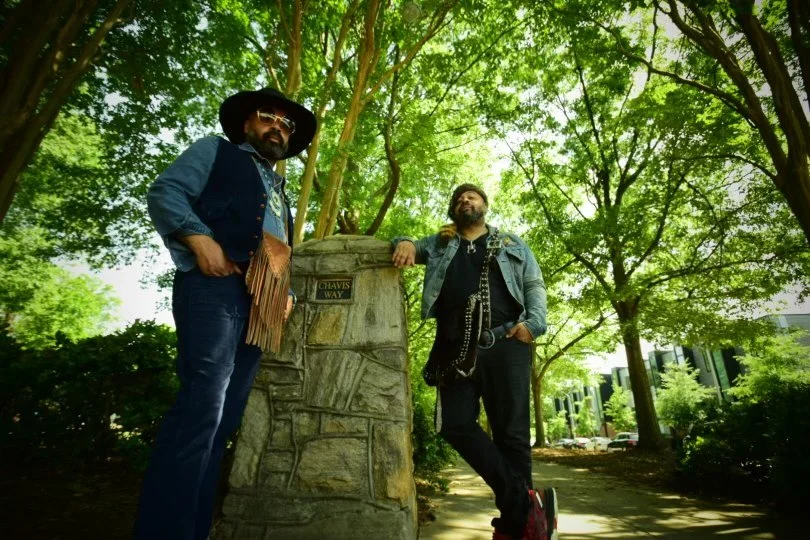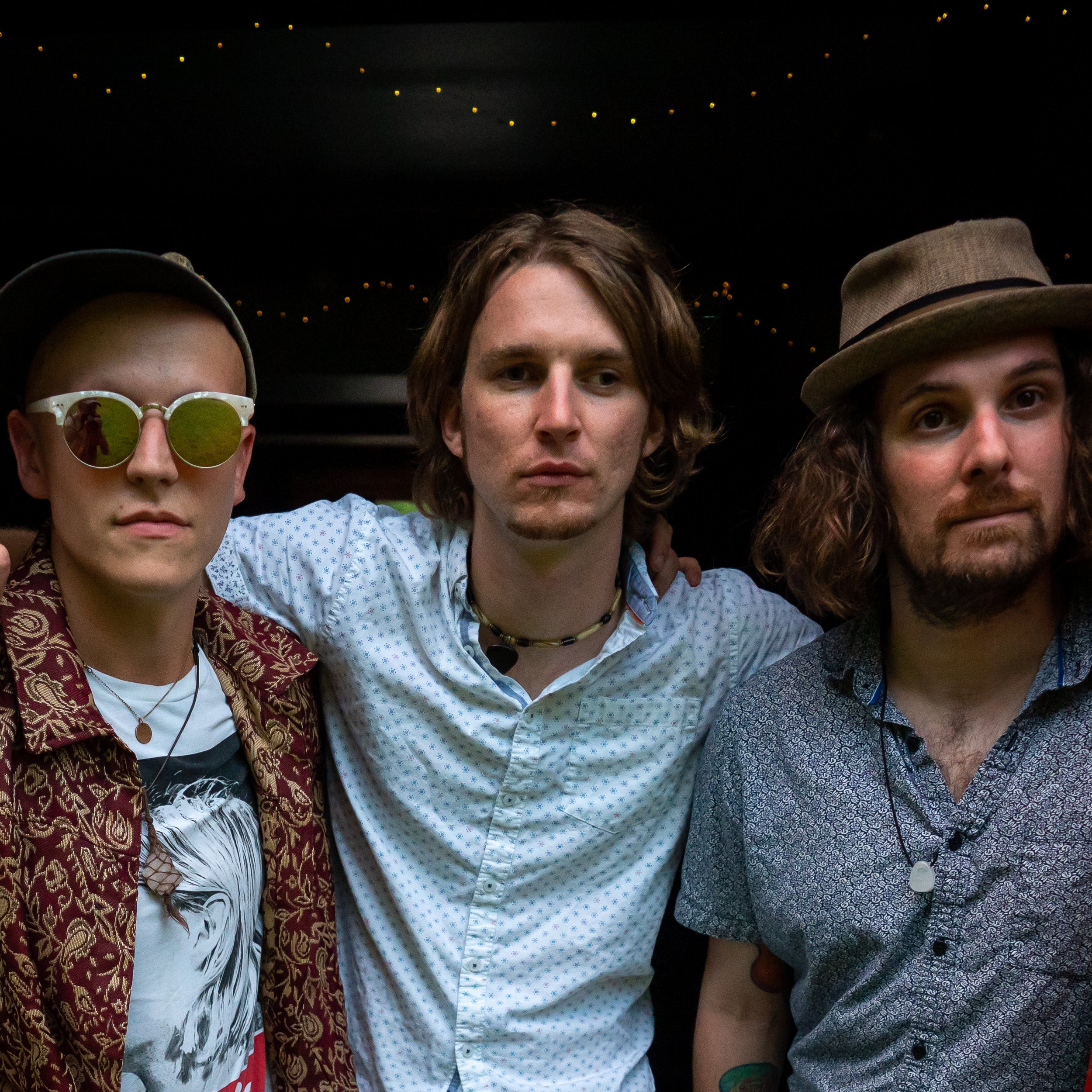Interview: Danny Chavis (The Veldt)
As I sunk deeper into a chair in my backyard, gazing upon the lush colors of the leaves at the tips of swaying trees, the beautiful, explosive sounds coming through my headphones were as majestic as anything I’d ever heard. Was it the psilocybin overtaking and magnifying my senses to heights that I’d never experienced before, or was The Veldt’s Afrodisiac really one of the best albums I’d ever heard? The answer to both is an emphatic “yes.”
Prior listens to the band’s 1994 masterpiece had already convinced me that The Veldt had been unjustly overlooked by the masses. The small dose of the mushroom-extracted hallucinogen merely enabled me with a new perspective, allowing me to drift deeper within Danny Chavis’ dream-like waves of swelling guitars and vocalist Daniel Chavis’ extraordinary romantic croon.
When the U.S.’s first great shoegaze band arrived on the scene in the late ‘80s, infusing the ethereal wall-of-guitars U.K. music style with American soul, there was no one else like them. Mainstream audiences weren’t ready for them. Decades later, it’s only become more apparent how ahead of their time the band was.
The major labels didn’t get it. A&R men had seen the success of Living Colour and sought out other Black rock artists to capitalize on. When The Veldt recorded its debut album with Cocteau Twins’ Robin Guthrie in 1989, Capitol Records failed to understand the Chavis brothers’ vision, shelving the record indefinitely. (That record will finally see the light of day in 2023.)
Formed in 1986, the Raleigh-based band was at the forefront of the Triangle’s indie rock scene that would have its heyday in the mid-’90s with the success of bands like Archers of Loaf and Superchunk. At the time, hardcore punk and metal were the styles dominating the music scene. Stylish Black dudes playing what could be described as a synthesis of Marvin Gaye and My Bloody Valentine couldn’t have been more alien to local audiences.
Finding mutual respect from peers in luminaries like The Jesus and Mary Chain, Cocteau Twins, and A.R. Kane, The Veldt had greater appeal in the U.K. and Europe where shoegaze had already made a stronger impression. Unfortunately, when Cocteau Twins invited The Veldt to join their European tour in 1993, the band’s A&R guy at Mammoth Records thwarted their plans, insisting on the band focusing on American audiences. This sort of lack of vision from industry folks was a consistent crux in the story The Veldt, especially during its early years.
Nevertheless, the band persisted, releasing four stellar records in the ‘90s, including the aforementioned Afrodisiac. Standout single “Soul in a Jar” even managed to crack the video rotation on MTV when it was still an influential music platform. With Afrodisiac, the band introduced hip-hop elements into its sound. As its sound continued to evolve, that influence would become more entrenched.
But as the 20th century came to a close, so did the first phase of The Veldt. The group disbanded, and the Chavis brothers moved to New York City. Fortunately, it didn’t take long before Daniel and Danny rekindled their flame. Joined by bassist Hayato Nakao, they reformed under the moniker Apollo Heights. Musically, the new group was a natural progression from The Veldt, incorporating more electronic elements into its unique “soulgaze,” and their run as Apollo Heights culminated with the release of White Music For Black People, featuring guest appearances from Mos Def, Robin Guthrie, Mike Ladd, and Dave Sitek (TV on the Radio). Despite earning respect from their peers and an underground cult following, they struggled to gain the acclaim they deserved.
In 2017, the Chavis brothers and Nakao revived The Veldt with the release of The Shocking Fuzz of Your Electric Fur: The Drake Equation, proving that the trio hadn’t lost any of the passion driving its sound forward over the years. Continuing on with the latest phase of The Veldt, the band released the Electric Revolution (Rhythm and Drone) EP earlier this year. The five songs, inspired in part by the racial tensions of recent years, may be its heaviest to date, and the Chavises’ hip-hop influences have also never been as apparent, particularly in a stunning shoegaze cover of Mobb Deep’s “Get Away.” Additionally, the soulful psychedelic closing track, “I Told The Stars About You,” features production by former Wu-Tang Clan engineer Carlos Bess (aka C12).
There’s little question that The Veldt helped set the foundation for many of the sounds that would come in the 21st century from artists such as TV on the Radio, The Weeknd, and Dälek. In recent years, R&B and hip-hop have drawn heavily from the amorphous psychedelic waves of shoegaze. While The Veldt’s steadfast approach to its unique creative vision may have resulted in less immediate commercial success than if the band had succumbed to early label pressure, its decades-long run has proven to be a vital-if-underappreciated part of music history.
The soulgaze legends will bring its influential sound to Fleetwood’s on Thursday, June 23. The headliners will be joined by Charlotte-based band The Mystery Plan, plus local group Knives & Daggers.Guitarist Danny Chavis recently took some time while out on the road to speak with Asheville Stages about the evolution of The Veldt, as well as what to expect from the band in the near future.
Jonny Leather: Are you still in New York, or have you moved back to North Carolina?
Danny Chavis: No, I haven’t [moved back to N.C]. I go back and forth a lot. My mom is there, so I help out from time to time whilst recording in our home studio at my brother’s apartment downtown.
JL: What was the state of the Raleigh/Chapel Hill scene when you were getting started?
DC: It was wide open, as I remember. The hardcore scene was really big at that time, and I was playing in a gospel band with a few of my high school friends.
JL: As North Carolina music veterans who’ve always been outsiders, you’ve undoubtedly had a unique perspective of the evolution of the music scene here. Did you play frequently in Asheville in the ‘90s when you were first establishing yourselves and do you have a strong connection with the city?
DC: No we didn’t — not as much as we would have wanted to — but most circles that would lead to it weren’t always open as people may have thought. There was always one excuse or another as to why we couldn’t play certain places, but we were too mentally advanced to care at the time, so we kept it moving, so to speak.
JL: Your new EP, Electric Revolution (Rhythm and Drone), hits with as much force as anything you’ve done. I’m especially in awe of “Red Flagz.” Can you tell me a little about how you’ve been able to stay inspired to continue pushing your sound in new directions?
DC: To sum up the last few years would be a disservice to years previous, with the exception of the pandemic. It would seem the racial unrest to be business as usual, in some aspects, but given the media coverage and all, we couldn’t help but feel the fury in the music and all — so it came kind of naturally in a dystopian kind of way. Life’s general marginalization has a way of making one louder to get your voice heard, so guitars help over bullets and racial epitaphs.
JL: Electric Revolution features a stellar cover of Mobb Deep’s “Get Away.” Was there something specifically about that song that inspired you to give it the “soulgaze” treatment?
DC: Coming up, I’ve always felt like it would be a great song if we flipped it in a gazed kind of way. Hayato and I were experimenting a lot with it — plus the atmosphere of the streets these days gave way to the final results with drummer/programmer Dan Milligan and James [Scott] of Populist Recording.
JL: From what I understand, you’ve got a new full-length, Entropy Is The Mainline To God, in the works. How’s that coming along?
DC: It’s coming out in August. It was going to be a double record but we decided to make a three-record set. There’s so much material, for at least five albums, not to mention the unreleased Cocteau Twins LP from 1989. We will be starting our own label, 5 BC, in the new year.
JL: When performing live, do you dig into the classic ‘90s era material like “Soul in a Jar” or any of Apollo Heights’ songs? I’d love to hear what an updated take on “Willow Tree” would sound like.
DC: Absolutely! We still play “Willow Tree.” It’s much the same but I guess louder. And we finally released an Apollo Heights song, “Gattaca Blues.”
JL: You’ll be on the road with your pals The Mystery Plan. What can you tell me about them?
DC: Jason and the crew are bringing sexy back to the fold, like Shelleyan Orphan and Cranes to a Dead Can Dance vibe, beautifully done. Such a delightful bunch of people.
IF YOU GO
Who: The Veldt + Knives & Daggers + The Mystery Plan
When: Thursday, June 23, 8 p.m.
Where: Fleetwood’s, 496 Haywood Road, fleetwoodschapel.com
Tickets: $10
(Photo courtesy of the band)




